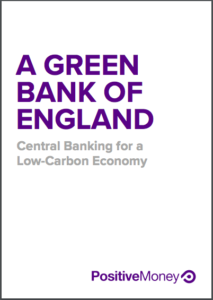New report: A Green Bank of England

At an international conference of financial supervisors, Bank of England Governor Mark Carney described the ‘transition in action’ underway as central banks and the financial sector at large begin to address climate change. Positive Money’s new report, released today, argues that while the initiatives so far represent welcome progress, policymakers should go further.
Climate change and the low-carbon transition are a central banking issue for two reasons. On the one hand, climate-related financial risk threatens the stability of the financial system. This goes for physical damage from weather, as well as the effect on costs and valuations associated with shifts in technology and policy. Both have the potential to reverberate through the economy, with destructive results.
On the other hand, investment is still well below the level required to build the infrastructure for a low-carbon economy. Central banks, as institutions tasked with supporting the public good, should contribute to raising private and public finance to close this ‘green investment gap’.
In the UK, the financial sector is highly carbon-intensive despite the momentum building in the smaller market for green finance. For instance, in 2015 Mark Carney gave a much-celebrated speech where he pointed to the high proportion of FTSE companies, weighted by market capitalisation, in carbon-intensive sectors. These proportions have only worsened: we estimate the 19 per cent Carney identified in natural resources and extraction has grown to over 23 per cent, while the 11 per cent in power utilities, chemicals, construction, and industrial goods has risen to over 13 per cent. Meanwhile, each year UK banks still make new loans worth several billions of pounds to fossil fuel companies.
Decarbonisation is not a ‘nice-to-have’ – it is required by law. The 2008 Climate Change Act sets mandatory targets for reducing carbon emissions, known as ‘carbon budgets’, for sequential five year periods. To meet the next two budgets, spanning from 2023 to 2032, while promoting economic growth, the Department for Business, Energy and Industrial Strategy published its Clean Growth Strategy in October 2017. However, even the policies contained in the Strategy are not sufficient to meet the required level of decarbonisation over the 2020s without using up ‘allowances’ of future carbon emissions. The plan, though ambitious, succumbs to short-termism at the final hurdle.
There are several policies the Bank of England could adopt to help tackle these problems. Using green macroprudential and monetary policies, it could help disincentivise high-carbon lending, decarbonise the financial sector, and help raise private and public investment in green sectors. Yet despite drawing attention to the climate issue, officials at the Bank resist calls for more proactive policies. Why?
Our analysis reveals that the Bank of England’s mandate plays a crucial role. The mandate tasks it with achieving price stability and, since 2012, safeguarding the stability of the financial system. Correspondingly, the Bank sees its role on the climate issue as purely derivative from the financial stability objective: so far, it has stuck to supervision and assessment of the exposure of the UK financial sector to climate risk.
That approach results in incoherence, both over time and across different forms of policy at the Bank. The Bank’s stance fails to take account of the long-term viability of the economy, as the costs of physical and transition risk will escalate rapidly unless we take action now. And monetary policy since the financial crisis has unintentionally privileged high-carbon sectors, which contradicts the Bank’s own concern over climate risk.

In our report released today, we propose several policies and political reforms that would hardwire the Bank of England for climate sustainability. The Chancellor of the Exchequer, a member of the elected government, could very easily make simple alterations to the Bank’s mandate via the remit for the Monetary Policy Committee and recommendations to the Financial Policy Committee. These changes would accelerate progress towards greener monetary and financial policy. The first step is a review of the monetary policy framework to assess its interactions with climate objectives, and to consider allowing the Monetary Policy Committee to promote decarbonisation with future monetary policy interventions.
The report was launched at an event in Parliament chaired by Fiona Harvey (environmental journalist at The Guardian) and featuring a high-level panel, including Barry Gardiner (Shadow Climate Change Minister), Baroness Featherstone (Liberal Democrat Spokesperson for Energy and Climate Change), and Lord Deben (Chair of the Committee on Climate Change, the independent advisory body on UK climate policy). Footage of the launch event will be available on the Positive Money website soon.